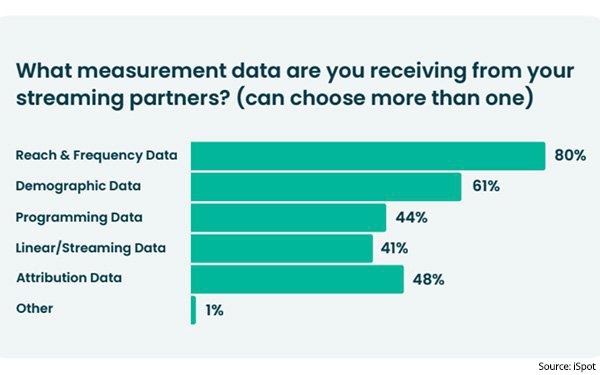
TV upfront brand budgets are now allocating on average
around one-third of the media schedules to streaming platforms, according to iSpot.
Linear TV advertising impressions are still at a high level.
Overall, linear TV advertising
impressions continue to dominate the TV advertising ecosystem, representing an 85% share in March 2025 -- down from 92% in January 2023.
Over that period, all OTT/streaming ad impressions
climbed to 14% share -- up from 6%.
In the first quarter of 2025, linear TV ad impressions were at 1.54 trillion -- down 4.3% from the year before.
National TV linear ad spending then
was estimated to be up 4% compared to the year before.
On average, 32% of overall upfront TV advertising budgets go to streaming platforms, according to the TV advertising-focused measuring
company -- with the top third of all TV upfront advertisers spending nearly half, or 48%.
advertisement
advertisement
Upfront TV deals -- where brands buy for the full TV season ahead of time -- typically represent
around 70% of all year-round national TV advertising.
Total year-round TV media deals include agreements made in the near-term scatter market.
The research here comes from a survey of
260 marketing executives representing 208 brands and media agencies.
Top individual brand categories for streaming platform media spend include travel -- where brands place 33% of their TV
budgets -- home/real estate (26%), pharmaceutical/medical (24%), and restaurants (23%).
On the flip side, education (18%), retail (16%), insurance (16%), vehicles (13%), and entertainment (7%)
are at relatively low share allocation to CTV.
One recommendation from the study is that all brands -- on average -- should shift 6.3% of the budgets to CTV to get better key performance
indicators (KPIs) and decrease linear TV impressions.
More than three-quarters of media executives who buy streaming (80%) say they get reach and frequency data from platforms, while 61% say
they get demographic data and 44%% get contextual/programming data.
With regard to "contextual" data, the report says this low level makes “it hard to optimize spend," adding: "This
underscores the importance of unified, cross-platform measurement.”
Fifty-three percent of media-buying and brand executives say "business outcome" is the most "critical" data when
making streaming TV buys, while 27% say it is "value" data, 11% say it is "verified ad delivery" and just 9% cite "program" data.